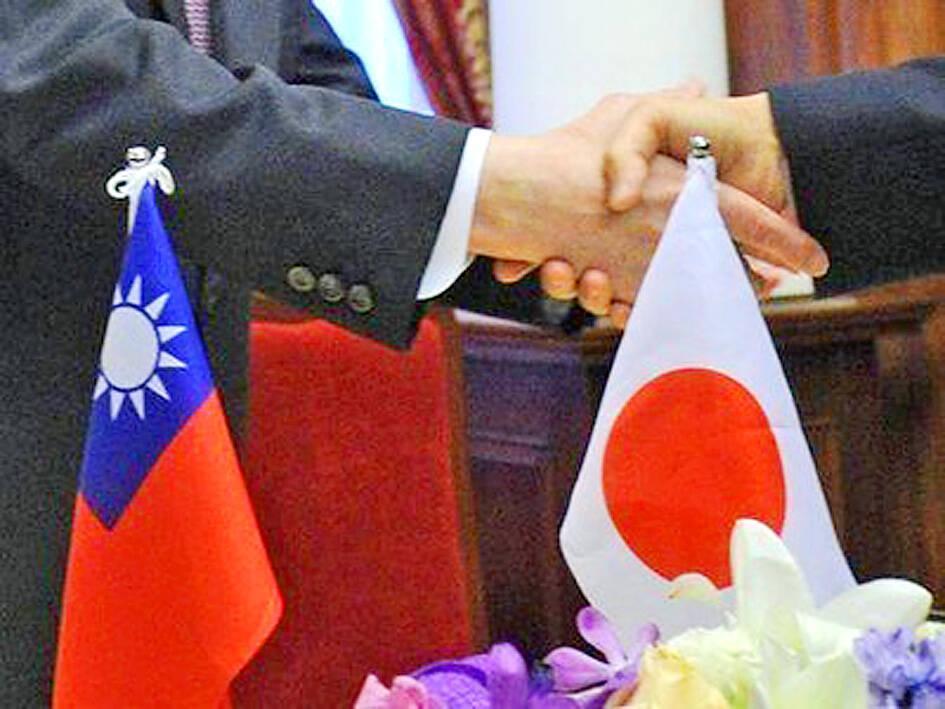The Japanese government has warned companies with operations in Taiwan that they should not expect government support in the event of an invasion, the Financial Times (FT) reported on Saturday.
The report quoted several anonymous sources from both Japan and the US which indicated that Japanese officials have told companies they would be “on their own” if a conflict with China were to break out, leading to less foreign direct investment (FDI) into Taiwan by Japanese firms.
Japanese officials told the FT that under Japan’s constitution, it could only deploy the Japan Self-Defense Forces (JSDF) abroad with the approval of a foreign government, which in a Taiwan scenario would be difficult given the two countries lack formal ties.

Photo: CNA
There “is no government in Taiwan from our viewpoint,” the report quotes an official as saying, meaning that JSDF involvement in any evacuation of private citizens would need approval from China.
Sources indicate such approval would be unlikely to materialize, it said.
The report cites Japanese diplomats and business executives who said the warnings have been going on for around three years, dating back to around the time of when then-US House of Representatives speaker Nancy Pelosi visited Taiwan.
That trip and subsequent tensions led to many firms reconsidering investments in Taiwan and contingency planning in the event of a crisis, it said.
The warnings have had a “chilling effect” on Japanese investment in Taiwan, the report quotes an anonymous US official as saying, which has decreased compared to investment from the US and EU.
One Japanese executive is quoted as saying that “risk assessment pretty much leads us to little interest in Taiwan,” due to the lack of security guarantees and government support.
Furthermore, several Japanese companies with large operations in Taiwan have conducted in-house exercises simulating what to do in the event of a conflict, including evacuations, it said.
Although government officials have been present in some of these exercises as observers, “the implicit understanding was that such efforts would be a private sector operation,” it said.
The JSDF told the newspaper that answering questions about a hypothetical situation would be difficult but that it would act in accordance with domestic and international laws.
The piece also quotes the Japanese foreign ministry as specifying that evacuating its citizens is one of its most important responsibilities and that it would “explore all possibilities” in the event of such an emergency.

Three batches of banana sauce imported from the Philippines were intercepted at the border after they were found to contain the banned industrial dye Orange G, the Food and Drug Administration (FDA) said yesterday. From today through Sept. 2 next year, all seasoning sauces from the Philippines are to be subject to the FDA’s strictest border inspection, meaning 100 percent testing for illegal dyes before entry is allowed, it said in a statement. Orange G is an industrial coloring agent that is not permitted for food use in Taiwan or internationally, said Cheng Wei-chih (鄭維智), head of the FDA’s Northern Center for

The Chinese military has built landing bridge ships designed to expand its amphibious options for a potential assault on Taiwan, but their combat effectiveness is limited due to their high vulnerability, a defense expert said in an analysis published on Monday. Shen Ming-shih (沈明室), a research fellow at the Institute for National Defense and Security Research, said that the deployment of such vessels as part of the Chinese People’s Liberation Army (PLA) Navy’s East Sea Fleet signals a strong focus on Taiwan. However, the ships are highly vulnerable to precision strikes, which means they could be destroyed before they achieve their intended

LOOKING NORTH: The base would enhance the military’s awareness of activities in the Bashi Channel, which China Coast Guard ships have been frequenting, an expert said The Philippine Navy on Thursday last week inaugurated a forward operating base in the country’s northern most province of Batanes, which at 185km from Taiwan would be strategically important in a military conflict in the Taiwan Strait. The Philippine Daily Inquirer quoted Northern Luzon Command Commander Lieutenant General Fernyl Buca as saying that the base in Mahatao would bolster the country’s northern defenses and response capabilities. The base is also a response to the “irregular presence this month of armed” of China Coast Guard vessels frequenting the Bashi Channel in the Luzon Strait just south of Taiwan, the paper reported, citing a

About 4.2 million tourist arrivals were recorded in the first half of this year, a 10 percent increase from the same period last year, the Tourism Administration said yesterday. The growth continues to be consistent, with the fourth quarter of this year expected to be the peak in Taiwan, the agency said, adding that it plans to promote Taiwan overseas via partnerships and major events. From January to June, 9.14 million international departures were recorded from Taiwan, an 11 percent increase from the same period last year, with 3.3 million headed for Japan, 1.52 million for China and 832,962 to South Korea,